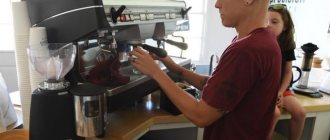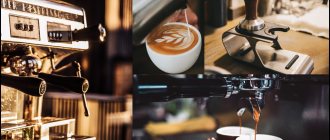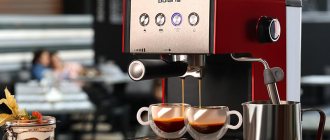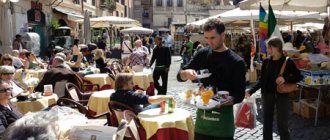1747
0
Font
A.A.
No time to read?
The popularity of coffee is growing steadily. The World Barista Championship (WBC) has been held annually since 2000. In Russia, the first coffee championship took place in 2003. Since then, the event has been held annually, and the profession has become more and more prestigious and in demand. New coffee shops are opening in Russian cities, and those who are attracted to working with coffee should go to barista courses.
Corporate barista schools
They operate at large chain coffee shops. To get into such a school, you need to get a job at the institution. Beginning baristas undergo special training that lasts about a month. There are regular refresher courses for those already employed. The following training centers enjoy a good reputation among professionals.
- Coffee Bean is a chain coffee shop with 20 years of experience. There are establishments throughout the center of Russia, from Moscow to Kazan. The company trains baristas for its own establishments, and holds special classes with promising employees to prepare for external championships. Graduates reached the finals of the Russian Barista Championship several times, successfully completing all qualifying stages.
How to get?
Get a job in one of the coffee shops. The list is on the official website.
- Doubleby is another Russian coffee chain that has reached the international level. It is known for its barista school, where the winner of the Russian Barista Championship 2016 studied, as well as 3 more people from the six best masters in the country according to the results of 2016. They study at school for about a month and a half; preparation for performances or serious competitions is a separate discipline.
How to get?
By responding to a vacancy and going through an interview for a job at one of the coffee shops. The list of cities of presence is on the official website.
- Traveler's Coffee . An international network company that operates a barista school. Trainings are conducted both for our own staff and for third-party customers. You can study individually. The basic course will take 16 hours and cost 13 thousand rubles. During this time, you can familiarize yourself with the theoretical part, learn how to prepare espresso and latte, and also set up a coffee machine to work with different recipes and grinding.
How to get?
By registering for courses by phone: 8-913-013-24-39. Geographically, classes are held in Novosibirsk.
What are the requirements for a barista?
The main requirement for most courses is a love of coffee and a desire to learn to understand it. Usually there are no entrance tests for admission. Teachers are happy to share their experience with everyone who loves coffee.
Age is also not a reason to refuse training. You don't have to be an adult to take a barista course. If you are not going to work in a new specialty (in our country this is permissible from the age of eighteen), you don’t have to wait until you reach adulthood.
Now you know how to become a barista. We told you where you can master this specialty and what you need for this. What kind of person should be who wants to give others the joy of enjoying delicious, aromatic coffee? What personal qualities are important for successful work in this field?
- The barista must be sociable and patient, above all. After all, a specialist in preparing and serving coffee communicates with visitors all day. And each of them requires an individual approach. A barista can be compared to an artist performing for the public. A good specialist knows the tastes and preferences of his clients, and with the help of a few questions he can quickly find out what this or that person prefers. This skill is also important because a considerable percentage of a barista’s earnings comes from tips, so the ability to win over a guest, find an approach to any visitor, and satisfy the tastes and wishes of the client is beneficial not only for the establishment where the coffee specialist works, but also , first of all, for himself;
- kindness and friendliness are also very important. Baristas must always remember that a favorable atmosphere in any establishment is created with the help of a friendly smile;
- responsibility, that is, strict adherence to professional ethics, which requires the preparation of an exceptionally high-quality drink;
- aesthetic abilities the ability to beautifully design and serve a drink.
Barista schools in coffee business companies
Sellers of professional equipment and large coffee shops offer, among other services, barista training. The advantage of such schools is that outsiders can study there. Among the well-known courses are the following:
- Omni coffee . The company specializes in roasting and selling specialty coffee. Omni Barista School is known for its large number of additional activities and a good basis for in-depth training. You can come here to gain serious knowledge and skills. A representative of this school took second place at the Russian Barista Championship in 2016.
How to get?
By registering on the company website. There is a school in Krasnodar, at the address: st. Red partisans 2/1.
- Sense of Coffee . The barista school is open at a trading company that supplies professional coffee equipment from abroad. Classes are held in the format of small seminars on various topics, including such specific ones as roasting beans or recognizing defects in coffee. There are special programs to prepare for barista championships.
How to get?
Sign up by phone. Classes are held in Moscow, at the address: Karamyshevskaya embankment, 44.
History of the profession
For the first time, such a profession appeared in Italy. A barista's job back then was to prepare coffee using an espresso machine. But in the 1980s, the position became popular in the United States thanks to its owner, Howard Schultz. While traveling in Italy, he liked the behavior of one of the baristas, so he filmed his work day. Upon returning home, Schultz decided to create such a position in his company.
Interest in this profession gradually grew. In Russia, unlike other countries, the barista is engaged only in preparing coffee. The bartender handles alcoholic drinks and cocktails, and he also brews tea. In Europe, a specialist can perform the duties of a coffee maker, waiter, dishwasher and even a cleaner.
Italy and other nearby countries have become famous for their male baristas. And in Russia and neighboring countries this position is usually occupied by girls. There is also a significant age difference. In Western Europe, the profession is considered prestigious; it requires a long period of study, so a person becomes a barista only at the age of 30-35. And in the Russian Federation and other Slavic states, this position is occupied mainly by students aged 18-24; they consider this work temporary.
Independent barista schools
They operate independently, under the auspices of associations or as schools of individual specialists who pass on their experience.
- Barista school at the Russian Barista Association . This is an independent professional association with its own training center. RBA acts as an organizer of various events; its authority in the professional environment is quite high. Training is offered in various programs. The basic course, intended for beginners, lasts 5 days and costs 25 thousand rubles. The advanced course lasts 3 days and costs 20 thousand.
How to get?
There is a schedule on the official website of the organization. You can make an appointment by phone. Training takes place in St. Petersburg, at the address: Ligovsky Prospekt, 50.
- Moscow barista school . Teaches basic fundamentals, the art of coffee painting, and advanced alternative brewing courses. Good, dynamic coaches, participation in television projects and active promotion have provided the school with a certain reputation. Many chain coffee shops that do not have their own training center order staff training here. Individual training for a basic barista course will cost 11.5 thousand rubles for 2 days.
How to get?
Register on the official website or call: +7 (903) 1-566-566. Training takes place in Moscow.
- One of the most experienced regional schools is located in Tyumen . It has been working since 2007 as part of the educational one. They teach you how to prepare all types of coffee and coffee drinks, in the program latte art and setting up a coffee machine. Own training center with Italian equipment. The cost for 8 days of training is 15 thousand rubles.
How to get?
Call and sign up for the next course by phone: +7 (3452) 50-00-06.
- Barista School under the Russian Barista League - Professional training for baristas of any level. These courses are suitable for beginners, experienced baristas and those who want to open a coffee shop. After these courses you can easily open your own business or become a professional barista. The office is located in Moscow. The cost of training is from 12 thousand rubles. Tel.. School website - ligabarista.ru.
Barista Training School
Barista Training School offers barista courses in Moscow from scratch. During the courses, cool teachers will tell you the theoretical part so that you learn everything about the principles of collecting, grinding and roasting coffee, its properties, storage conditions, and requirements for presentation. They will also tell you about the rules for selecting milk, cream, and syrups. And in practice you will be taught how to make latte and espresso, cappuccino, raff and Americano.
For you:
Does coffee cause allergies and what are its symptoms?
I visited this barista school in person, talked with its leadership and teachers, and this is what I learned.
Barista Training School took a thorough approach to compiling the training program. They have developed several options for the same course so that the student has the opportunity to choose the most suitable one. The guys have two training formats:
- Individual sessions. Suitable for those who find it easier to perceive information in a personal course format. Personally, I liked this particular format because I need more time to practice, I am used to working and learning at my own pace. Some more obvious advantages of individual classes: you will be supervised by a personal trainer who will monitor the entire training process and answer your questions in real time.
- Group classes. They are for those who want to communicate with colleagues and share their experience, who easily perceive information and do not want to overpay for individual training.
At the end of the course, everyone is given a certificate, and for those who have proven themselves more than others, the course organizers promise to help them find a job. To make it easier for you to understand and choose the appropriate course, I have compiled a voluminous but very convenient table for you:
| Course name | Duration | Cost, rub. | What will they teach? |
| Barista. A basic level of | 2 days 5 hours | RUB 10,000 in a group, individually RUB 12,000 | Let's talk about coffee:
They will show you the equipment and teach you how to use it:
They will tell you about grinding coffee:
Espresso:
Milk:
|
| Barista. Advanced level | 3 days 5 hours | 15000 | Everything is the same as in the basic course, plus they will talk about:
Alternative types of brewing:
Preparation of latte, cappuccino, raffe coffee, flat white, specialty drinks |
| Latte art | 2 days for 3 hours | 10000 | All about latte art: what is latte art, factors influencing latte art
|
| Latte art advanced | 2 days 5 hours | 14500 | In addition to what is included in the basic Latte art course, you will undergo practice: Drawings of medium complexity: double tulip, inverted tulip, Rose Complex drawings: swan, complex rose. (Performed only after you have succeeded in drawing basic and medium complexity drawings). |
| Professional barista course (advanced training) | 15000 | Here you will take an extensive theoretical course, and they will also help you develop your sensory skills: they will tell you how they are involved in assessing taste, the influence of color on taste, visual assessment, introduce you to the wheel of aromas and much more. |
Barista Training School also has great programs for those who want to open their own coffee shop. For example, a course on starting a business costs 20,000 rubles + only 10,000 rubles, the creators of the course valued their complete manual with a detailed step-by-step guide to opening a retail outlet. The course describes in detail each stage of opening: from selecting premises and registering with the tax authorities to finding a barista and buying a coffee machine. I recommend.
Sonya
Barista Training School graduate
I had long dreamed of opening my own coffee shop, but I understood that without basic knowledge I would get nowhere. First, I took the “Barista” course. Basic level”, and then entered into an agreement with Barista Training School for full support in opening a coffee shop. A manager came to my city, together we selected a place, bought a coffee machine, and looked for a barista. Now I have a successfully operating business, I am planning to open a second takeaway coffee outlet. I am grateful to the school for this approach and real help in building a business.
The guys also have a large-scale course on opening a coffee shop with online support - it costs 70,000 rubles, and there is a program for those who need a coffee shop almost “turnkey” - a manager will come to you and accompany you at every stage of opening. This service costs 120,000 rubles.
How to choose a barista school
With so many schools to choose from, how do you find the one that's right for you?
- If you are new to the profession, then focus on corporate schools. You don’t have to pay for them, and you can immediately apply the acquired skills in the workplace.
- If you want to improve your skills, then look for a good school that is actively involved in the country’s coffee life - organizing championships, qualifying rounds, competitions and festivals. Such institutions are themselves interested in smart students and can help in your personal advancement.
- Look for your coach, pay attention to personalities. Experienced specialists will be able not only to teach the technique, but also to share those nuances that make a master out of a professional.
Description and characteristics of the profession
Expert opinion
Ekaterina Kolokolova
Career guidance. Certified specialist in the problems of children's involvement in learning.
The word “barista” appeared more than a hundred years ago and was originally interpreted as “an employee working behind the bar.” During this period, the meaning of the term changed significantly. Now this profession means a master of preparing coffee-based drinks, as well as serving them.
He has his own equipped workplace. There he first processes natural coffee beans, then prepares the composition using one of numerous methods, after which he designs it and serves it to the client. The employee monitors the serviceability of the equipment, its cleanliness, and the quality of the ingredients used.
Real experts don't stop there. They are constantly mastering new recipes and coming up with their own drinks. They spend a lot of time studying coffee varieties, methods of collecting and processing them, and studying the features of different types of grinding beans. They also pay increased attention to the quality of water, the combination of various ingredients, and the parameters of the machines and mechanical devices used. An experienced barista is able to select a drink to suit the client’s character, determine the quality of the composition by the aroma or taste of coffee, and correct a product with shortcomings.
Another feature of the profession is that, like any bartender, a barista must be a good psychologist. His salary often depends not only on his ability to make coffee, but also on his ability to create the right atmosphere for the client.
A barista must know a set of basic rules for preparing classic recipes. Be able to operate an espresso machine at a professional level.
Professional qualities of a barista
The main thing for a barista is a good knowledge of coffee, its varieties, degree of roasting, grinding, and preparation methods. You also need practical skills, which can be obtained, for example, in specialized courses for baristas. As for education, a diploma of secondary or vocational education is sufficient, preferably in the field of gastronomy. In practice, when you apply to a cafe, you can often count on the employer to train you.
If you plan to develop in this profession, it is advisable to learn English in order to communicate freely with foreign clients. In addition, you need to cultivate such traits as high personal culture, the ability to work with different people, endurance and a willingness to constantly improve your skills. You will also need enthusiasm and a large dose of creativity combined with precision.
Place of work
A barista can work in small coffee shops, restaurants, bars and cafes. If you already have experience, then such a specialist will quickly find a suitable option. And with a lot of experience, you can become a jury at competitions.
The workplace should be functional and at the same time harmonious. Main components:
- bar counter;
- coffee machine;
- refrigeration showcase.
The bar counter can be of any shape; different materials are used for its manufacture - metal, plastic, wood, marble. This is a workplace, so it must have the necessary communications, sockets or outlets for electrical cables, hidden areas for sewerage and water supply. The optimal dimensions of the bar counter are: length - 80-150 cm per barista, height - 130-140 cm, width - 60-80 cm.
A coffee machine is the main equipment of a specialist. There are two types of devices: autonomous and those that require sewerage and water connections. Inexpensive options are suitable for small coffee shops; for restaurants and prestigious establishments it is better to purchase luxury equipment. Common models have a cup counter, several bins for different types of beans, and a cappuccino maker.
When choosing a refrigerated display case, the power of its operation and appearance are taken into account. Since confectionery products are placed in it, the equipment must attract customers. In inexpensive models, only the top two shelves are cooled, the rest are designed for a full load. You can sew a display case into the bar counter to save space. And in a restaurant with free space, it is better to install a tall refrigerated cabinet with rotating shelves.










